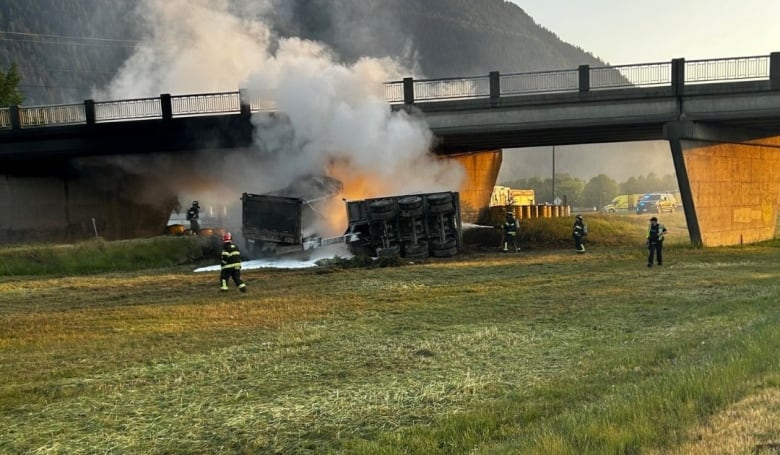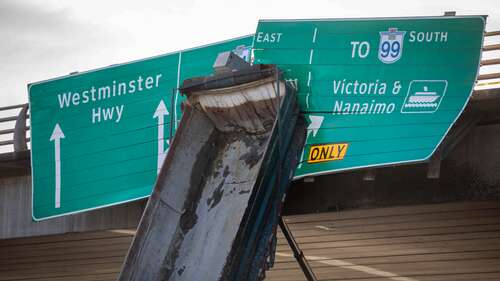British Columbia truck drivers who strike overpasses will face higher penalties and potential jail time, B.C.’s transport minister announced Tuesday, in the province’s latest move to try to curb a rash of destructive collisions.
Under proposed changes to B.C.’s Commercial Transport Act (CTA), drivers found responsible could be ordered to pay fines up to $100,000 and spend as much as 18 months in jail.
B.C. Minister of Transportation and Infrastructure Rob Fleming said the move is aimed at the “tiny percentage” of drivers he says don’t take safety seriously on B.C.’s roads.
“Simply put there’s no excuse for collisions with our infrastructure,” Fleming told reporters on Tuesday after tabling the amendments in the legislature.
“These crashes need to stop.”
Over-height vehicles have struck overpasses 35 times since 2021, according to data from the province.
The collisions have not only caused injuries, Fleming said, but they have closed major routes for weeks combined and have caused millions of dollars in damage, he added.
“Families, businesses, the economy all suffer when we have incidents and crashes like we’ve seen in the last year,” he said.
Fleming said the new penalties are the highest in Canada and are on par with consequences for railway and dangerous goods accidents.

The B.C. Trucking Association, which represents trucking companies in the province, applauded the announcement on Tuesday and said the changes will help keep roads safer for everyone.
“Nobody sets out to hit an overpass,” association president Dave Earle said. “What this [announcement] does is it sends the message to say you need to be more diligent, you need to take the time, to make sure you do the job right.”
However Gagan Singh, a spokesperson for the United Truckers Association which represents truckers at the Port of Vancouver, said he worries the penalties are too focused on drivers.
“A trucker by himself is not the only wrongdoer,” he said.
Singh said companies and their employees, like loaders and dispatchers, also play a role in ensuring a load is the correct size, but many truck drivers, particularly newcomers to Canada, feel they can’t speak up or refuse work because their work permits are tied to their employers.
“It’s a double edged sword … if they refuse, they may lose the work [and] on the other hand if they accept it and get caught, they get [fined or jailed],” he said.
But Fleming said Tuesday that with new measurement tools and the province’s mapping tool, “it has never been easier” to safely transport a load in B.C.
The new penalties “will send a clear message there are steep consequences for failure to do so,” he said.
On The Coast6:09United Truckers Association calling for wide-ranging safety reviews
The United Truckers Association is addressing the issue of trucks hitting overpasses after several incidents in recent weeks. Their spokesperson Gagan Singh outlines the changes they would like to see in the industry.
Latest push to prevent crashes
B.C. has been cracking down on drivers and companies involved in over-height collisions since November 2023, including increasing roadside fines for drivers and requiring in-cab warning devices to alert drivers when a dump box is raised.
The province also cancelled the operating license for one trucking company involved in six separate collisions, and has suspended at least one other company from operating, pending an investigation.
After one company continued driving in B.C. using its Alberta-licensed fleet, Fleming urged his federal counterpart to close “loopholes” in Canada’s trucking regulations.
B.C. Premier David Eby was asked about two lawsuits from separate arms of a trucking business following an overpass crash. He did not hold back in his response.
“We have 100,000 truck movements every day, about three million a month, 36 million a year in B.C., so 31 crashes with a high impact, we ought to be able to get this down … close to 0,” Fleming said in a Jan. 8 letter to federal Transportation Minister Pablo Rodriguez.
The United Truckers Association and other groups have previously called for increased training for drivers to prevent crashes. On Tuesday, Singh urged the government to study the crashes more closely to determine which vehicles are at greater risk and why.
He said he worries aging infrastructure is playing a role as well.
“The way that accidents are happening more in our province, it’s makes us shameful,” said Singh.




